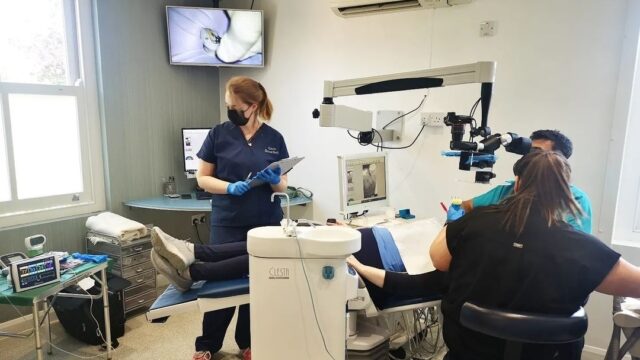What are they?
Dental nurse specialties are the different types of work that a dental nurse can do. Each specialty requires specialised training and certification. There are numerous specialties in dentistry, including: Endodontics (root canal treatment), Oral and Maxillofacial Surgery, Orthodontics (braces), Conscious Sedation, Paediatric Dentistry, Periodontics (gum disease treatment), Prosthodontics (dentures and other prosthetic devices), and Restorative Dentistry (repairing broken or worn teeth).
If a certain specialty isn’t your interest, there is also the option to train to undertake additional roles at work. These include becoming an Oral Health Educator, taking radiographs or impressions and applying fluoride varnish.
What is the difference between Orthodontics and other dental nurse specialties?
Orthodontics is a specialty of dentistry that focuses on the study, prevention, diagnosis, and treatment of malocclusion. Orthodontists are specially trained in the diagnosis and treatment of dental problems like crooked teeth, gaps between teeth and other abnormalities related to the position of your teeth.
Orthodontic treatments include braces, retainers or other devices used to slowly move teeth into position so they can fit together properly when your jaw grows bigger.
What’s involved in being an oral surgery nurse?
Oral surgery is a specialist area of dentistry which involves surgical procedures and treatment for conditions affecting the mouth, jaws, teeth and gums. Oral surgeons employ a range of diagnostic techniques such as radiography (x-rays), CT scanning and MRI scanning to diagnose problems before performing any necessary treatments. Surgical nurses work alongside dentists and dental surgeons to assist with these procedures. They work in a variety of clinical settings including hospitals, clinics and private practices. The duties of an oral surgeon include:
- Removing wisdom teeth (third molars) or other impacted teeth
- Treating jaw fractures following trauma or accidents
- Handling the removal of tumours from the mouth
Is a career as a Dental Nurse right for you?
If you are looking for a career in the dental field, then you should definitely consider becoming a dental nurse. The demand for these skilled professionals is high, which means that there will always be plenty of job opportunities.
A career as a dental nurse would be a great choice if you love working with children and families as they go through this life-changing experience. This specialty also provides opportunities for advancement within the profession by allowing you to specialise in different areas such as orthodontics or paediatric dentistry.
But what exactly does it take to become an oral surgery nurse? And how can you get there?
The answer is simple: education and training! First step is to enrol with a course provider. Here at Cavity we offer a Diploma in Dental Nursing Course which is accredited by City and Guilds. Our assessors have years of experience and most of them have been nurses themselves so plenty of opportunities for you to ask questions and get properly informed. Following completion of the course, you will be registered with the General Dental Council as a fully registered dental nurse. In order to move into a specialty, it is recommended to spend some time in general practice and get confident with the different procedures. Opportunities in the practice may arise for you to assist in various oral surgery procedures which will further enrich your experience. Whenever you feel ready to move to the next stage, you can enrol onto a Oral surgery nursing course which will give necessary knowledge and skills that you need.
We hope this guide has given you a clearer understanding of the different specialties available in dentistry, as well as giving you some pointers on how to take your career to the next level. The specialisation examples provided in the articles are there as a simple guide to demonstrate the different advancement opportunities that dental nursing provides. If you’re interested in becoming a part of one of these specialties, then we encourage you to check out our website and get in touch!

